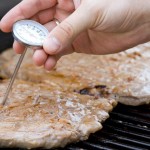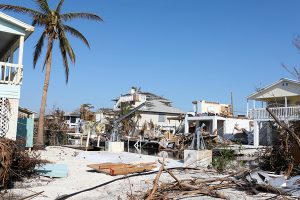Hurricane 101: Prevent food, water-borne illnesses after a natural disaster
In 2017, four major hurricanes struck North America, leaving communities in Houston, Florida, Puerto Rico and the Caribbean struggling to rebuild. Earthquakes and wildfires have added to the danger and destruction. With more extreme weather patterns on the horizon and the possibility of extreme flooding and power outages, food and water can be severely compromised in affected areas. DOs urge families to take necessary precautions regarding food safety and health.
Understand the risk
People should take the risk of hurricanes and other natural disasters seriously. “When you’re asked to evacuate, if at all possible, leave and go somewhere safe,” says Mary MacGregor, DO, infectious disease specialist in Morton Grove, Illinois. “I think many people underestimate the potential hazards. They think they’ll have power and access to clean water within a certain time frame, so preparation is often not optimal.”
Stock up on the essentials
The loss of power represents a significant shift in the ability to maintain basic household functions including cooking, cleaning and sanitation. Experts recommend stocking up on bottled water, hand sanitizer, bleach, flashlights and also making sure to have a battery-operated radio and cash on hand. “Non-perishable items and bottled water are key, and an ample supply of canned goods, baby formula, and other items with longer shelf lives,” says Mia Taormina, DO, FACOI, chair of the department of infectious diseases at DuPage Medical Group in suburban Chicago.
Water, water, water
In the case of a natural disaster where evacuation is not an option, prepare by filling the tub with water to create an additional water supply. Use this supply plus bottled water that has not been exposed to flood waters following a hurricane. Here are other precautions outlined by The Centers for Disease Control and Prevention:
- Store at least 1 gallon of water per day for each person in your household and each pet.
- If tap water is clear, add less than ⅛ teaspoon of unscented bleach for each gallon. If tap water is cloudy, add a little less than ¼ teaspoon of unscented bleach for each gallon. Mix well and wait 30 minutes before using.
- Boil water to kill many disease-causing organisms
- If you’re nursing an infant, breastfeed or use ready-made formula
- Freeze water in small plastic pouches in the freezer for water supply and to keep foods cold.
While you still have power, prepare your fridge and freezer
- Use appliance thermometers. Freezer temperatures should be below 0 degrees F and refrigerator should be 40 degrees F or lower.
- Pack foods tightly together in the freezer to help food to stay cold longer. If the doors are kept closed, a full freezer will maintain its temperature for 48 hours, and about 24 hours if the freezer is half-full. Refrigerated items are good for 4-6 hours, frozen items for 48 hours.
- Purchase block ice or dry ice. Fifty pounds of dry ice should keep a fully-stocked 18-cubic-foot freezer cold for two days, according to the USDA website.
When power is restored, assess what’s good
- If you didn’t use a thermometer during a power outage, assess the viability of each item.
- Typically, if food still contains ice crystals, it is safe to use or refreeze.
- Throw out any perishable foods after four hours without power including milk, eggs, meat, poultry, soft cheese, leftovers or deli items.
- Throw out any food that may have come into contact with flood water if it is not in a waterproof container. Also discard cardboard juice, milk, or baby formula boxes if they have come into contact with flood water. They cannot be sanitized.
- Discard canned goods that have been damaged or if the can is swollen or punctured or leaking in a manner that prevents stacking.
- Remove labels on cans because they can allow bacteria and dirt to grow. Wash cans with hot, soapy water if available.
Know the truth
Even if food looks healthy or smells normal, it may not be safe. One of the biggest misconceptions is that if you leave the refrigerator doors closed that food can last for “a few days.” But this is simply not the case,” says Dr. Taormina. “Temperatures will fall relatively quickly and lead to unsafe temperatures where bacteria will grow and food will spoil.”
Staying healthy
It’s important to be up-to-date on your immunizations including the Tdap, a combination vaccine that protects against three potentially life-threatening bacterial diseases: diphtheria, tetanus and pertussis, says Dr. MacGregor. “With infants and younger people, you have to be especially careful because their bodies are much smaller and, thus, quicker to become dehydrated.”
It is important to seek medical attention if you become ill after ingesting food or water that may have been contaminated. Do not taste food to determine if it’s safe. Instead, if there is a doubt, throw it out.

